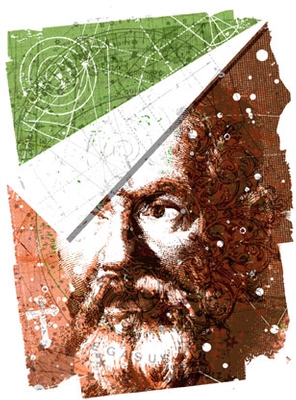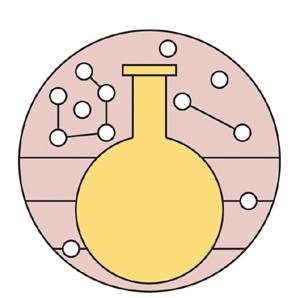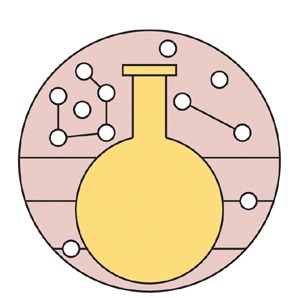 In 1750 a Florentine man of letters, Giovanni Battista Nelli, took some mortadella as his contribution to a picnic with friends. Opening the packet, he discovered it had been wrapped in a document written by Galileo. Nelli traced the wrapping paper back until he found a grain-bin full of Galileo documents which were being sold off as waste paper by the heirs of Galileo’s last pupil, Vincenzo Viviani. Almost everything we know about Galileo derives from that bin, and we have no way of knowing how many key documents went to wrap steaks, kidneys and salami. But that is not the only or indeed the greatest obstacle to understanding Galileo.
In 1750 a Florentine man of letters, Giovanni Battista Nelli, took some mortadella as his contribution to a picnic with friends. Opening the packet, he discovered it had been wrapped in a document written by Galileo. Nelli traced the wrapping paper back until he found a grain-bin full of Galileo documents which were being sold off as waste paper by the heirs of Galileo’s last pupil, Vincenzo Viviani. Almost everything we know about Galileo derives from that bin, and we have no way of knowing how many key documents went to wrap steaks, kidneys and salami. But that is not the only or indeed the greatest obstacle to understanding Galileo.
When Galileo died in 1642 the Vatican decreed that there could be no memorial to him in any church – no plaque, no tombstone, no statue. But his student Viviani turned the front of his own house into an elaborate memorial to his former master, recording his discoveries, but carefully making no mention of his support for Copernicanism or his condemnation by the Inquisition. Viviani also wanted to publish, in Italy and under ecclesiastical censorship, an edition of Galileo’s works. But in many cases he destroyed the originals of Galileo’s letters and kept only copies, and there is no doubt that the copies were carefully edited; in one case we know he falsified a text. Viviani’s purpose, it seems, was to prove that Galileo had never defended Copernicanism after his condemnation in 1633 and had always been a faithful Catholic (a view consistently maintained by the Church. In 1992, Pope John Paul II, for example, described Galileo as “a sincere believer”).
Every text Galileo published up until 1633 was approved by ecclesiastical censors. Every letter he wrote, especially after 1633, was written in the knowledge it might be read by an Inquisitor. What is remarkable, overall, is not what he does say but what he doesn’t: in all his writings he never mentions Jesus, sin, redemption or a life after death. He owned two copies of Lucretius, although he never referred to him in writing. And we have one decisive piece of evidence which up until now has been overlooked. In 1639 Galileo’s closest long-term collaborator, a Benedictine monk and professor of mathematics in Rome called Benedetto Castelli, wrote to Galileo expressing his joy at some wonderful news – the news that Galileo, now old and blind, had finally become a Christian believer. Castelli’s letter may leave us in some doubt about Galileo’s beliefs in the last three years of his life, but it leaves us in no doubt at all that the Galileo he had known for 35 years had never previously been a Christian.
The recognition that Galileo was no lifelong Christian transforms our understanding of his greatest book, the Dialogue, for which he was condemned in 1633. Galileo’s core argument here is that we live in a universe whose purpose is unknowable: the one thing we can be sure of is that it was not designed either to be understood by us or for our benefit. People complain, he says, that the Copernican universe is too big, full of stars that serve no purpose. “It is a great folly for us Terrestrials to want to be arbiters” of the sizes of the celestial bodies, “and regulators of their local dispositions, we being quite ignorant of all their affairs and interests.” In place of the homely geocentric world of Ptolemaic astronomy and Christian theology, Galileo offered a vast universe, a universe that was in all probability infinite, in which the Sun was merely one of innumerable stars, and in which there might be other planets where creatures might falsely imagine, as we do, that the cosmos is built around them. We, he says, are merely “earthlings”: our knowledge of the cosmos is restricted by our limited experiences. There is a magnificence about this relativism:
“I am certain that a person born and raised in a huge forest among wild beasts and birds, and knowing nothing of the watery element, would never be able to frame in his imagination another world existing in nature differing from his, filled with animals which could travel without legs or fast-beating wings, and not upon its surface alone like beasts upon the earth, but everywhere within its depths; and not only moving, but stopping motionless wherever they pleased, a thing which birds in the air cannot do. And that men lived there too, and built palaces and cities, and travelled with such ease that without tiring themselves at all they could proceed to far countries with their families and households and whole cities. Now as I say, I am sure that such a man could not, even with the liveliest imagination, ever picture to himself fishes, the ocean, ships, fleets, and armadas.”
So the fact that we cannot imagine what life on other planets is like does not mean there is no life there; and (as a Lucretian would add) the fact that we construct gods in our own image does not mean that we have any knowledge of the gods. In 1670 Pascal, reluctantly inhabiting a Galilean universe, was to say that the eternal silence of infinite space alarmed him. Galileo was not alarmed: indeed he seems to have taken delight in escaping from a claustrophobic geocentric universe into unending space. Viviani was right about one thing: Galileo was the first space traveller.
Of course, when dealing with the Church authorities Galileo insisted he was a good Christian. But even after his condemnation he continued to take intelligent risks. Texts were smuggled out of Italy, to be published by Protestants abroad. Elaborate precautions were taken to protect his correspondence – letters were delivered by hand, or sent under false covers, or transmitted by the diplomatic pouch. Sometimes, afraid that his letters would be intercepted, he said the opposite of what he thought, but his correspondents had little difficulty understanding his meaning. “We laughed aloud when we read your letter,” his friend Fulgenzio Micanzio wrote to him, after he and Galileo’s Dutch publisher had received a letter in which Galileo said (or seemed to say) that he did not want his Dialogue reprinted abroad. In order to read Galileo we have to learn to read past these layers of deception that were designed to mislead the church authorities, but not his friends.
Nowadays we tend to think that the first great scientist to come into conflict with Christianity was Darwin and that the trial of Galileo rested on a misunderstanding. After all, the Church has adapted to Copernican astronomy, and even to the idea that there might be life on other worlds. This view greatly underestimates Galileo’s importance. Darwin may have demonstrated that we are not the result of a divine plan; Galileo’s contribution was to show that if there is a plan, it is not about us. Throughout his life Galileo acted not as a loyal member of the Church, but as a concealed but determined unbeliever. He persisted despite being reported to the Inquisition half a dozen times, despite being threatened with torture and being held under house arrest. Hobbes said that the Catholic Church had condemned the Dialogue “as a book that will do more hurt to their Religion than all the books have done of Luther and Calvin, such opposition they think is between their Religion and natural reason.” We need to learn again to read Galileo as Hobbes read him.
Galileo: Watcher of the Skies by David Wootton is published by Yale University Press

